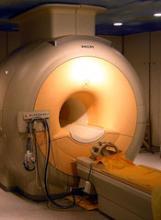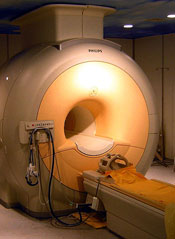User login
The US Food and Drug Administration (FDA) said it has not found any evidence of adverse health effects from gadolinium retention in the brain following the use of gadolinium-based contrast agents (GBCAs) for magnetic resonance imaging (MRI).
The agency noted that all GBCAs may be associated with some gadolinium retention in the brain and other body tissues.
However, an FDA review showed no evidence that gadolinium retention in the brain is harmful.
Therefore, the FDA said it will not restrict GBCA use, although the agency will continue to assess the safety of GBCAs and plans to have a public meeting on the issue in the future.
The manufacturer of OptiMARK (gadoversetamide), a linear GBCA, updated its label with information about gadolinium retention. The FDA said it is reviewing the labels of other GBCAs to determine if changes are needed.
Recommendations
The FDA said its recommendations regarding GBCAs have not changed.
The agency advises healthcare professionals to limit GBCA use to circumstances in which the contrast agent can provide necessary information. Professionals should also consider the necessity of repetitive MRIs with GBCAs.
Patients, parents, and caregivers with any questions or concerns about GBCAs should discuss the agents with their healthcare professionals.
The FDA is also urging patients and healthcare professionals to report side effects involving GBCAs to the agency’s MedWatch program.
About the FDA review
For its review, the FDA looked at scientific publications and adverse event reports submitted to agency.
These data showed that gadolinium is retained in organs and suggested that linear GBCAs cause retention of more gadolinium in the brain than macrocyclic GBCAs. However, the data did not show adverse health effects related to this brain retention.
The only known adverse health effect related to gadolinium retention is nephrogenic systemic fibrosis (NSF), a disease characterized by thickening of the skin, which can involve the joints and limit motion.
NSF is known to occur in patients with pre-existing kidney failure. However, recent publications have shown reactions involving thickening and hardening of the skin and other tissues in patients with normal kidney function who received GBCAs and did not have NSF. Some of these patients also had evidence of gadolinium retention.
The FDA said it is evaluating such reports to determine if these fibrotic reactions are an adverse health effect of retained gadolinium.
The agency is also continuing its assessment of GBCAs, investigating how gadolinium is retained in the body. And the FDA’s National Center for Toxicological Research is conducting a study on brain retention of GBCAs in rats.
PRAC review
A recent review by the European Medicines Agency’s Pharmacovigilance Risk Assessment Committee (PRAC) suggested there are no adverse health effects associated with gadolinium retention in the brain.
However, the PRAC recommended suspending the marketing authorization of certain linear GBCAs because they cause greater retention of gadolinium in the brain than macrocyclic GBCAs.
The PRAC’s recommendation is undergoing an appeal, which will be further reviewed by the PRAC and the Committee for Medicinal Products for Human Use. ![]()
The US Food and Drug Administration (FDA) said it has not found any evidence of adverse health effects from gadolinium retention in the brain following the use of gadolinium-based contrast agents (GBCAs) for magnetic resonance imaging (MRI).
The agency noted that all GBCAs may be associated with some gadolinium retention in the brain and other body tissues.
However, an FDA review showed no evidence that gadolinium retention in the brain is harmful.
Therefore, the FDA said it will not restrict GBCA use, although the agency will continue to assess the safety of GBCAs and plans to have a public meeting on the issue in the future.
The manufacturer of OptiMARK (gadoversetamide), a linear GBCA, updated its label with information about gadolinium retention. The FDA said it is reviewing the labels of other GBCAs to determine if changes are needed.
Recommendations
The FDA said its recommendations regarding GBCAs have not changed.
The agency advises healthcare professionals to limit GBCA use to circumstances in which the contrast agent can provide necessary information. Professionals should also consider the necessity of repetitive MRIs with GBCAs.
Patients, parents, and caregivers with any questions or concerns about GBCAs should discuss the agents with their healthcare professionals.
The FDA is also urging patients and healthcare professionals to report side effects involving GBCAs to the agency’s MedWatch program.
About the FDA review
For its review, the FDA looked at scientific publications and adverse event reports submitted to agency.
These data showed that gadolinium is retained in organs and suggested that linear GBCAs cause retention of more gadolinium in the brain than macrocyclic GBCAs. However, the data did not show adverse health effects related to this brain retention.
The only known adverse health effect related to gadolinium retention is nephrogenic systemic fibrosis (NSF), a disease characterized by thickening of the skin, which can involve the joints and limit motion.
NSF is known to occur in patients with pre-existing kidney failure. However, recent publications have shown reactions involving thickening and hardening of the skin and other tissues in patients with normal kidney function who received GBCAs and did not have NSF. Some of these patients also had evidence of gadolinium retention.
The FDA said it is evaluating such reports to determine if these fibrotic reactions are an adverse health effect of retained gadolinium.
The agency is also continuing its assessment of GBCAs, investigating how gadolinium is retained in the body. And the FDA’s National Center for Toxicological Research is conducting a study on brain retention of GBCAs in rats.
PRAC review
A recent review by the European Medicines Agency’s Pharmacovigilance Risk Assessment Committee (PRAC) suggested there are no adverse health effects associated with gadolinium retention in the brain.
However, the PRAC recommended suspending the marketing authorization of certain linear GBCAs because they cause greater retention of gadolinium in the brain than macrocyclic GBCAs.
The PRAC’s recommendation is undergoing an appeal, which will be further reviewed by the PRAC and the Committee for Medicinal Products for Human Use. ![]()
The US Food and Drug Administration (FDA) said it has not found any evidence of adverse health effects from gadolinium retention in the brain following the use of gadolinium-based contrast agents (GBCAs) for magnetic resonance imaging (MRI).
The agency noted that all GBCAs may be associated with some gadolinium retention in the brain and other body tissues.
However, an FDA review showed no evidence that gadolinium retention in the brain is harmful.
Therefore, the FDA said it will not restrict GBCA use, although the agency will continue to assess the safety of GBCAs and plans to have a public meeting on the issue in the future.
The manufacturer of OptiMARK (gadoversetamide), a linear GBCA, updated its label with information about gadolinium retention. The FDA said it is reviewing the labels of other GBCAs to determine if changes are needed.
Recommendations
The FDA said its recommendations regarding GBCAs have not changed.
The agency advises healthcare professionals to limit GBCA use to circumstances in which the contrast agent can provide necessary information. Professionals should also consider the necessity of repetitive MRIs with GBCAs.
Patients, parents, and caregivers with any questions or concerns about GBCAs should discuss the agents with their healthcare professionals.
The FDA is also urging patients and healthcare professionals to report side effects involving GBCAs to the agency’s MedWatch program.
About the FDA review
For its review, the FDA looked at scientific publications and adverse event reports submitted to agency.
These data showed that gadolinium is retained in organs and suggested that linear GBCAs cause retention of more gadolinium in the brain than macrocyclic GBCAs. However, the data did not show adverse health effects related to this brain retention.
The only known adverse health effect related to gadolinium retention is nephrogenic systemic fibrosis (NSF), a disease characterized by thickening of the skin, which can involve the joints and limit motion.
NSF is known to occur in patients with pre-existing kidney failure. However, recent publications have shown reactions involving thickening and hardening of the skin and other tissues in patients with normal kidney function who received GBCAs and did not have NSF. Some of these patients also had evidence of gadolinium retention.
The FDA said it is evaluating such reports to determine if these fibrotic reactions are an adverse health effect of retained gadolinium.
The agency is also continuing its assessment of GBCAs, investigating how gadolinium is retained in the body. And the FDA’s National Center for Toxicological Research is conducting a study on brain retention of GBCAs in rats.
PRAC review
A recent review by the European Medicines Agency’s Pharmacovigilance Risk Assessment Committee (PRAC) suggested there are no adverse health effects associated with gadolinium retention in the brain.
However, the PRAC recommended suspending the marketing authorization of certain linear GBCAs because they cause greater retention of gadolinium in the brain than macrocyclic GBCAs.
The PRAC’s recommendation is undergoing an appeal, which will be further reviewed by the PRAC and the Committee for Medicinal Products for Human Use. ![]()

